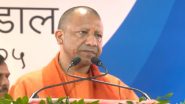Apia (Samoa), Oct 26 (AP) Commonwealth countries adopted Saturday their first ocean declaration during their summit held for the first time in the Pacific island nation of Samoa as calls from some of Britain's former colonies for reparatory justice for the trans-Atlantic slave trade grew louder.
The Apia Ocean Declaration was announced during the closing session of the 27th Commonwealth Heads of Government Meeting, or CHOGM, and calls on all 56 Commonwealth nations to protect the ocean in the face of severe climate, pollution and over-exploitation.
More than half the Commonwealth members are small countries like Samoa, many face significant, some even existential, threats from rising seas.
While the environmental threat was foreshadowed as a predominant theme going into the summit, the transatlantic slave trade from Britain's colonial history dominated the discourse through the opening days.
Also Read | Pakistan: 16 Vloggers, TikTokers Arrested in Punjab for Spreading Fake News of Rape of Girl Student.
'A line in the sand' declaration
The Apia Commonwealth Ocean Declaration for One Resilient Common focuses on recognising maritime boundaries amid sea-level rise, protecting 30 per cent of oceans and restoring degraded marine ecosystems by 2030, and urgently finalising the Global Plastics Treaty. It also calls for ratifying the high-seas biodiversity treaty, developing coastal climate adaptation plans, and strengthening support for sustainable blue economies.
Samoa Prime Minister Fiame Naomi Mata'afa said in a statement released by her office that it was fitting for “our first ocean declaration” to be adopted "in the Blue Pacific continent given climate change has been recognised as the single greatest threat to the security and well-being of our people.”
The Commonwealth represents a third of the world's population, and 49 of its 56 countries have a coastline. The organisation says 25 of its members are increasingly impacted by climate change, rising sea levels, growing temperatures and increasing ocean acidity – impacting sea life, ecosystems and the communities that depend upon them.
Mata'afa said the declaration must become “a line in the sand” for the world to collectively transform “ocean exploitation into protection and sustainable stewardship.”
Outgoing Commonwealth Secretary-General, Patricia Scotland said in a statement they were “immensely proud of this achievement” which "sets the standard for forthcoming international meetings, generating momentum for ocean protection as we head towards COP29 in Azerbaijan in November, and next year's UN Ocean Conference."
Slavery justice conversation to continue
Calls from some of Britain's former colonies for a reckoning over its role in the trans-Atlantic slave trade was the thorniest issue at the summit and specifically reparatory justice.
King Charles III, who attended his first Commonwealth Heads of Government Meeting as sovereign, said in his address on Friday history couldn't be changed but that he understood “the most painful aspects of our past continue to resonate.”
Although he stopped short of mentioning financial reparations, which some leaders at the event urged, his remarks were seen as an acknowledgment of how strongly many felt about the issue in countries that Britain once colonised.
Included in the 52-point official Leaders Statement on Saturday was a paragraph that urged a “meaningful, truthful, respectful conversation” to build a fair future.
The communique also directed the Commonwealth secretary-general to engage governments and stakeholders in reparatory justice consultations, with a special focus on the impact on women and girls.
“(The communique) agrees that this is the time for conversation,” said Britain's Prime Minister Keir Starmer at a press conference in Apia on Saturday. “But I should be really clear here. In the two days we've been here, none of the discussions have been about money. Our position is very, very clear in relation to that.”
“Let me first be clear that the slave trade, slave practice, was abhorrent, and it's very important we start from there. Abhorrent is the right word.”
Earlier Saturday, Shirley Ayorkor Botchwey, the Minister for Foreign Affairs and Regional Integration in Ghana, was announced as the incoming Secretary-General of the Commonwealth.
Botchwey, who has urged financial reparations for the past enslavement of colonised people, replaces Patricia Scotland of the United Kingdom who had been in the post since 2016.
Antigua and Barbuda was also announced as the host for the next CHOGM in 2026. (AP)
(This is an unedited and auto-generated story from Syndicated News feed, LatestLY Staff may not have modified or edited the content body)













 Quickly
Quickly















